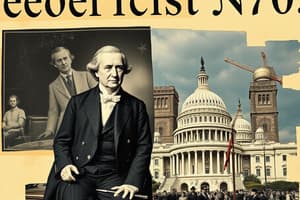Podcast
Questions and Answers
What is Federalist Ten?
What is Federalist Ten?
A document written by James Madison in the late 1700s discussing the differences between a democracy and a republic.
What is a faction?
What is a faction?
A small political dissenting group within a larger one.
Madison believes a democracy can prevent the violence in factions.
Madison believes a democracy can prevent the violence in factions.
False (B)
Match the following arguments to their descriptions from Federalist Ten:
Match the following arguments to their descriptions from Federalist Ten:
Why does Madison argue that a republic is necessary?
Why does Madison argue that a republic is necessary?
What role do representatives play in a republic according to Madison?
What role do representatives play in a republic according to Madison?
How does size and scale impact a republic?
How does size and scale impact a republic?
Flashcards are hidden until you start studying
Study Notes
Federalist Ten Overview
- Written by James Madison in the late 1700s, Federalist Ten addresses the differences between a democracy and a republic.
- Madison argues for the superiority of a republic over a democracy in managing the dangers of factions.
Factions
- A faction is defined as a small political dissenting group within a larger one, often emerging from economic divisions.
- The primary source of factions in the U.S. is the conflict between the rich and the poor.
- Madison believes democracy fails to control the violence that can ensue from factions.
Republic vs. Democracy
- Madison posits that a republic can effectively tame factions, unlike a democracy, which tends to exacerbate violence.
- He notes that historical events, such as the French Revolution, illustrate the bloodshed that can occur without a stabilizing republican structure.
- Madison emphasizes that individuals are often incapable of self-governance, making a republic necessary for societal stability.
Size and Scale
- In a republic, representatives are typically more knowledgeable and capable of refining popular opinions, leading to better governance.
- Representatives act as a buffer between the people and decision-making, promoting long-term thinking and the greater good.
- An expanded territory in a republic encourages diverse interests, making it difficult for factions to unify around a single cause, thus reducing the potential for conflict.
Studying That Suits You
Use AI to generate personalized quizzes and flashcards to suit your learning preferences.




